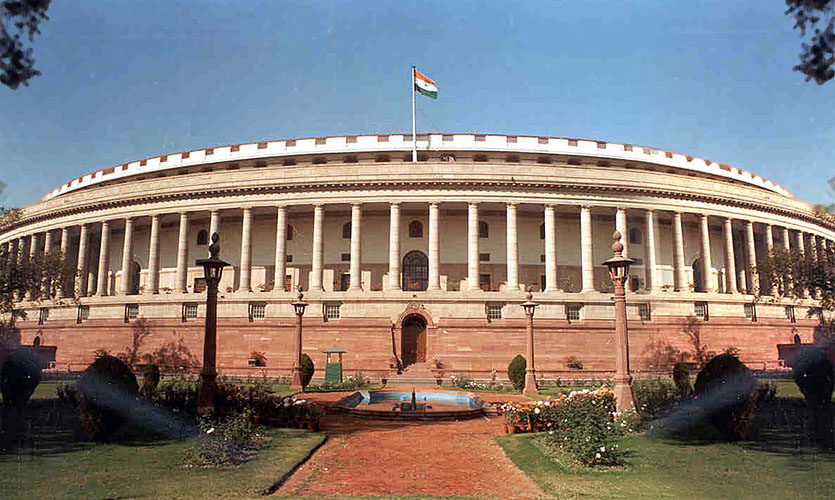A huge political stir erupted among the opposition parties over the compilation of “unparliamentary words” ahead of the Monsoon Session of the Parliament that will begin on Monday. According to the new list released by the Lok Sabha Secretariat on Wednesday, use of words like ‘Jumlajeevi’, ‘ Tanashah’, ‘COVID spreader’, ‘dictator’, and ‘incompetent’ will be “expunged” during the debate in both the Upper and Lower Houses of the Parliament.
Soon after the Parliament’s 50-page document was released, the Opposition hit out at the Narendra Modi-led BJP government and described the move as a “gag order”. Opposition parties also accused the Modi government of “throttling democracy” by banning the use of these words in the Parliament.
Responding to the criticisms, Lok Sabha Speaker Om Birla said that the latest move is just a compiled list of words and expressions deemed unparliamentary. He explained that banning the use of such words in the Parliament is not a new tradition, and has been in practice since 1959. “No word has been banned. Members are free to express their views. No one can snatch that right, but it should be as per decorum of Parliament,” said the speaker during a press conference.
What Are The New Banned Words In Parliament?
According to the list released by the Parliament secretary, the words termed unparliamentary are:
Shakuni – The illusionist who fueled animosity between the Pandavas and the Kauravas, leading to the Mahabharata
Jaichand – A king of the Gahadavala dynasty of northern India, Jaichand is believed to have helped Muhammad Ghori against Prithviraj Chauhan in the second battle of Tarain in 1192 AD.
Taanashah/Taanashahi – Dictator/Dictatorship
Vinash purush– Destructive male
Jumlajeevi – Person who used to make fake statements
Baal Buddhi – Kiddish thinking
Dohra charitra – Dual personality
Nikamma – Useless
Nautanki – Gimmick
Dhindora peetna – Making a scene
Behri sarkar – Deaf government
Chamcha/Chamchagiri – bootlicker/bootlicking
Chelas – Blind followers
Ghadiyali – Acting like a fox
Kala din – Black day
Kala bazari – Black market
Khareed farokht – Negotiate
Vishwasghat – Betrayal
Aasu – Tears
Apmaan – Insult
Asatya – Lies
Ahankaar – Ego
Tbe English words that have been banned in parliament are: COVID spreader, Lollipops, Snoopgate, Bloodshed, Bloody, Betrayed, Ashamed, Abused, Anarchist, Cheated, Childishness, Corrupt, Coward, Criminal, Crocodile Tears, Disgrace, Donkey, Drama, Eyewash, Fudge, Hooliganism, Hypocrisy, Incompetent, Mislead, Lie, Untrue, Goons, Sexual harassment.
What Do The Rules Say?
Amid the criticism over the new list of banned words, the Lok Sabha Speaker said that those who are opposing the move are not aware about the 1100-page dictionary comprising unparliamentary words. According to Birla, such steps have been taken in the past in 1954, 1986, 1992, 1999, 2004, 2009, and 2010.
Rule 303 of the ‘Rules of Procedure And Conduct Of Business In Lok Sabha’ says: If in the opinion of the Speaker a minute of dissent contains words, phrases or expressions which are unparliamentary or otherwise inappropriate, the Speaker may order such words, phrases or expressions to be expunged from the minute of dissent.
Rule 380 says: If the Speaker is of opinion that words have been used in debate which are defamatory or indecent or unparliamentary or undignified, the Speaker may, while exercising discretion, order that such words be expunged from the proceedings of the House.
Gag Order
Opposition parties said that the list is an attempt to suppress the voices of lawmakers, and to prevent members from attacking the Centre during the Monsoon Session.
Taking a jibe at the Modi government, Wayanad MP Rahul Gandhi said that this is the “new dictionary of new India”. Defining the unparliamentary adjective, Rahul Gandhi wrote on Twitter, “Words used in discussion and debates which correctly describes the PM’s handling of the government, now banned from being spoken.”
Senior Congress leader Mallikarjun Kharge said that members will continue to use those words in the Parliament regardless. Meanwhile, West Bengal Congress chief Adhir Ranjan Chowdhury wrote a letter to Speaker Om Birla and sought to withdraw the latest list of unparliamentary words.
TMC MP Derek O’Brien said that the Centre has issued a “gag order” ahead of the new Parliament session. He said in a tweet that he will continue to use these words and the Parliament can suspend him if they deem so necessary.
New Rajya Sabha MP from the Aam Admi Party (AAP), Raghav Chadha, also took a jibe at the Modi government and said that words like ‘jumlajeevi’ became unparliamentary while ‘andolanjeevi’ remains there. “The negative side to this list of words is that it shows that the government is fearful of facing the truth,” said the AAP leader.
Read more: Delhi HC Slams Centre Over One Page Response To PM CARES Fund Plea










